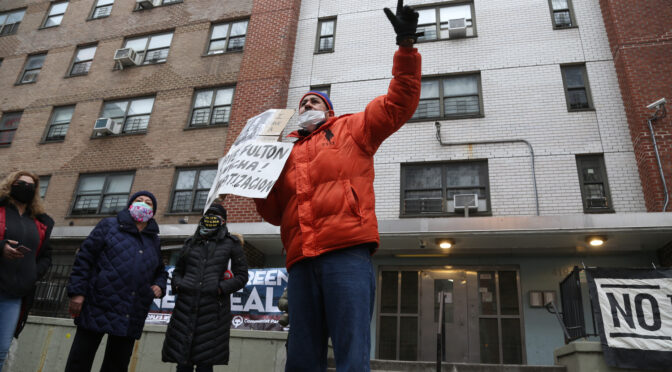An oped by Norman Siegel and Pedro Wolfe are respectively a civil rights lawyer and a student at Skidmore College.
Public housing sits at a crossroad. Though New York City was once at the forefront of the nation’s commitment to affordable public housing, decades of degradation, loss of government financial support and the looming prospect of privatization have brought the future of public housing into question.
How far we have fallen.
Public housing in the United States dates back to 1937, when President Franklin D. Roosevelt passed the Housing Act following his comprehensive New Deal program. That law committed itself to “remedy the unsafe and insanitary housing conditions and the acute shortage of decent, safe and sanitary dwellings for families of low income, in rural and urban communities…”
Under Mayor Fiorello H. La Guardia, the New York City Housing Authority (NYCHA) became a champion of public housing. With the establishment of the First Houses in the Lower East Side, now a historical landmark, NYCHA became an example nationwide for the efficacy of newly created public housing programs.
It went on to create new developments on the Harlem River in 1937 and Williamsburg in 1938, developments which stand to this day in service of low income residents. Primarily built between 1945 and 1965, New York City currently has 325 developments spread across the city which contain some 180,000 apartments, and houses anywhere between four and six hundred thousand people.
The nation’s commitment to public housing took a blow during the Ronald Reagan era. President Reagan halved the federal budget for public housing and Section 8 vouchers, which are federal funds to help low-income people pay for housing, within his first year in office. By the end of the 1980s, federal funding for local government efforts was cut by 60%.
Public housing now faces another historic hurdle, one which has already altered public housing across the nation. Here in New York, home to the nation’s largest public housing system, we must not fail the test.
In 2011, Congress passed the Rental Assistance Demonstration program, known as RAD. The program sought to remedy years of reduced federal funding to public housing by encouraging private developers to renovate and manage public property with limited government oversight.
Following alleged civil rights violations in Hopewell, Va., Laurel, Miss., Baltimore and Philadelphia, the Government Accountability Office conducted an investigation into HUD and their RAD program and found a lack of civil rights protections and guidelines written to protect tenants in converted developments.
By the GAO’s own conclusion, “HUD cannot reasonably assess the effects of ongoing and completed RAD conversions on residents and compliance with resident safeguards….”
Now, RAD has found supporters in the highest offices of New York City. Mayor de Blasio, whose stewardship of NYCHA has, like many of his predecessors, left so much to be desired, recently unveiled plans to renovate 62,000 NYCHA apartments — a third of the city’s public housing stock — through RAD.
He has recently appointed Greg Russ, a strong advocate of the program, to head NYCHA. Now, the city aims to accelerate the privatization of public housing in a place which once pioneered the needs of low-income families.
A growing number of NYCHA residents fear that RAD conversions will erode their rights.
Data supports their anxiety. An August 2019 City Limits article reported that the Ocean Bay Houses in Far Rockaway was the first public housing development in New York transferred under RAD. The conversion brought much-needed repairs to a development debilitated by Hurricane Sandy in 2012, but the new private managers quickly escalated evictions.
Between January 2017 and February 2019, the new managers reportedly evicted some 80 households, making it the top development for evictions under NYCHA.
The time to defend public housing’s founding principles has come to a head. Promises of “public-private” partnerships are misguided and antithetical to the original concept of public housing. We need to find the political will and financial resources to keep public housing public.
Source: Keep public housing public: There are too many risks to private management – New York Daily News
